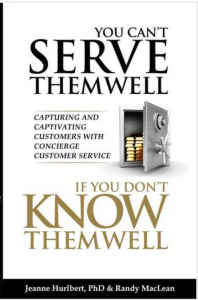
It sounds simple. Learn your customers’ needs, and start giving your customers the service they want. How does it work in practice, though?
Although the core principles of Concierge Customer Service and customer-centric innovation do apply to all businesses, becoming customer-centric means, by definition, that you must adapt the Concierge Customer Service system to your customers. To do so, you must understand, from your customers’ point of view, what kind of service they want and tailor your service to their preferences.
You can’t serve your customers well if you don’t know them well!
Once you get information, you must not only use it to tailor your Concierge Customer Service system to your customers’ preferences but also communicate this valuable information to your employees. Do this consistently, to ensure that customer experience remains front of mind to everyone in your organization.
As a young girl, I saw clearly that my father loved people and was masterful in understanding who they were and what “made them tick.” In our small-town environment of the 1960s, talking to his customers proved sufficient to provide the business intelligence that fueled his success. But times change. To put Concierge Customer Service in place in today’s world, you have to first answer 2 critically important questions:
1. What do your customers want?
2. How satisfied are they with the extent to which you’re giving them what they want?
The answers can’t be your gut reaction . . . they must be data-driven. And unlike my father, you can’t answer these two questions just by talking to your customers. You also can’t count on your salespeople to tell you accurately what your customers want and how satisfied they are.
Why are conversations with customers and reports from salespeople inadequate—and likely misleading? Because people are much less likely to tell you things you might not want to hear when you talk with them face-to-face than when you give them a chance to respond confidentially in a survey. (Notice that we describe surveys as “confidential” rather than “anonymous.” Anonymity means that you have no way of identifying particular respondents. With online surveys, responses are almost never anonymous. Confidentiality, on the other hand, means that you know the identity of respondents but also protect that identity.) Sociologists have a fancy name for that, social desirability response. Research clearly documents just how pervasive and how deleterious the effects of social desirability response can be, not only in telephone or face-to-face conversations but also in interviews.
This means that if you talk with your customers, you will be far less likely to hear any negative feedback that you need to hear than if you use a confidential survey. Getting accurate feedback— good and bad—is critical not only to building and maintaining your Concierge Customer Service system but also ensuring continuous process improvement in your organization.
The process of garnering accurate customer data has proved to be a major stumbling block for far too many wholesale distributors because many of you are still gathering intelligence the way my father did. Here are the problems that typically hamstring companies like yours:
1. As we alluded to above, many of you rely on feedback you hear at customer events, information from your salespeople, and other kinds of anecdotal evidence to understand customer sentiment and this leaves you vulnerable—you may not even realize just how vulnerable. Serving your customers well requires systematic feedback from your customers, gathered through well-crafted surveys. (Anecdotal evidence comes from personal observations or stories and provides limited utility. The limitations stem not only from the fact that these data are often collected casually but also from the fact that, even when they are collected more systematically, they represent too small a number of cases to provide generalizability. Systematic feedback comes from a structured, scientific process that governs not only the method by which the data are collected but also the number of cases and the method by which those cases are selected.)
2. Even distributors who use surveys to measure customer sentiment typically don’t have the tools that provide the data you need to protect your profitability. You often rely on overall indicators, such as Net Promoter Scores, that cannot provide sufficient information to orient your customer service, ensure continuous process improvement, and fuel your marketing. Achieving these outcomes requires both general and specific satisfaction data, as well as measures of customer loyalty.
3. In addition to asking the wrong questions, many distributors have trouble getting answers from customers because you don’t have the right tools to elicit responses.
To serve your customers effectively, you must avoid those problems so you can answer those two critical questions of (1) what your customers want and (2) how well you’re giving them what they want.
It is vital to answer those questions, systematically, ensuring that you understand at a deep level “what keeps your customers awake at night” and how well you’re satisfying them right now. Then, you can use the information to fully customize your Concierge Customer Service system.
 Want to learn more?
Want to learn more?
This blog post is based off material from my book with Randy MacLean:
“YOU CAN’T SERVE THEM WELL IF YOU DON’T KNOW THEM WELL: Capturing and Captivating Customers with Concierge Customer Service™”
You can get the first two chapters for FREE here.
If you’d like a full copy of the entire book, you can get it here.
 Dr. Jeanne Hurlbert, President of Hurlbert Consulting is an expert in sociology and survey research. After spending more than 25 years in academia, she now uses her extensive behavioral science expertise to help companies like yours distinguish yourselves through customer service. What sets her approach to customer service apart is that she begins by helping companies meld research and marketing to find out:
Dr. Jeanne Hurlbert, President of Hurlbert Consulting is an expert in sociology and survey research. After spending more than 25 years in academia, she now uses her extensive behavioral science expertise to help companies like yours distinguish yourselves through customer service. What sets her approach to customer service apart is that she begins by helping companies meld research and marketing to find out:
(a) exactly what their customers want and
(b) exactly how well they’re succeeding in giving customers what they want.
You can schedule a consult with her by going to www.ConciergeCustomerService.com; you can call her at 888-590-9677; or send an email here. And, if you’d like to complete her complimentary assessment to see how well you’re doing in knowing and serving your customers well, just go to www.FixYourService.com.





